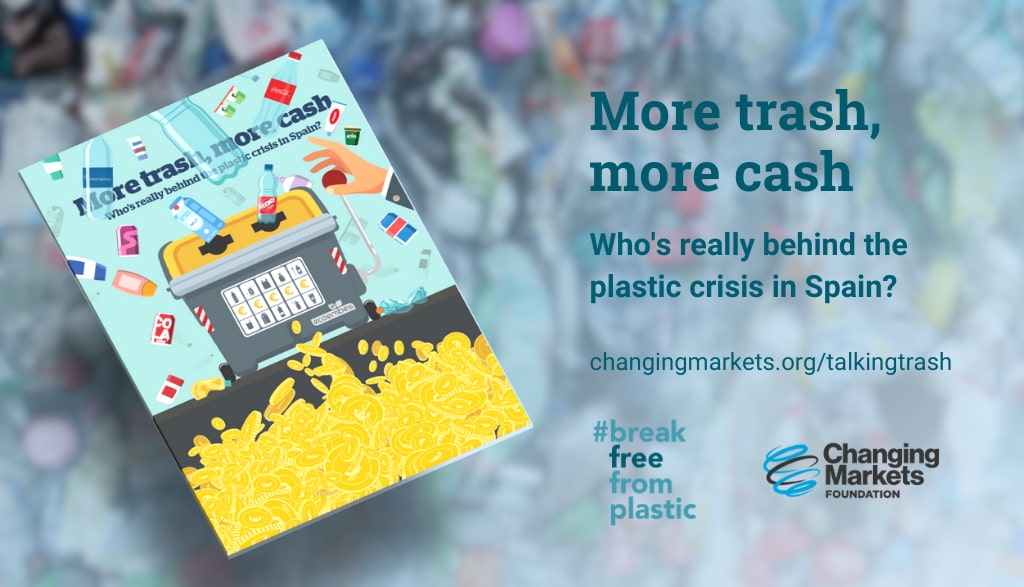◾ FMCGs and retailers are endorsing a voluntary initiative proposed by Ecoembes, Reciclos – a distraction tactic aimed at derailing the implementation of a Deposit Return System in Spain and hence undermining the country's ability to meet EU targets.
◾ The report also calculates the cost of littering: Spanish taxpayers pay up to €744 million per year just to clean litter generated by single-use packaging. A significant part of this – up to 529 million EUR/year – is the cost of cleaning up beverage containers.
Spain is at a key decision moment on how it will address the plastics crisis. This year it is expected that the Waste Law and the Royal Containers Decree will be published through which the Spanish government intends to implement the EU waste legislation. As one of the biggest plastic users, Spain is also the second biggest polluter of the Mediterranean Sea and has failed to meet 2020 EU targets on recycling.
In this context, the investigation 'More Trash, More Cash: who is really behind the plastic crisis in Spain' - published by the Dutch foundation Changing Markets with the support of the Spanish Alianza Residuo Cero and the Break Free From Plastic movement - reveals how the plastic polluters have successfully prevented any attempts to reform the Spanish waste management system for years and are now once again gearing up to derail meaningful implementation of new EU targets, adopted in the Single Use Plastics (SUP) Directive.
The latest attempt to derail real solutions to the plastic crisis is once again spearheaded by the producer responsibility organisation Ecoembes, which unites the biggest consumer goods companies, like Coca-Cola, Unilever, Nestlé, and Danone, and the biggest supermarkets, like Mercadona, Alcampo, Carrefour and Lidl. The industry has rallied behind Reciclos, a voluntary return and reward system that the report defines as a false solution that has already been rejected in other countries. The Changing Markets investigation details significant shortcomings in this industry-supported project: it does not incentivise consumers to return more than 10 used containers a week, it excludes various groups (youth, people who do not own a smartphone, etc.), and it is potentially open to fraud. In addition, it is evident that Ecoembes does not have a plan for a significant roll-out of this system to achieve meaningful volumes of plastic bottles return, which makes it impossible for the industry to meet the separate collection target of 90%, as stipulated by EU SUP. In fact, the Balearic Islands’ and Valencia’s governments have already indicated that real solutions lie elsewhere.
"Reciclos is the industry's latest desperate attempt to delay real solutions in Spain such as the introduction of a Deposit Return System and reuse policies,” said Ximena Banegas, Campaigns Adviser from the Changing Markets Foundation. “Without a doubt, Reciclos is one of the worst examples of greenwashing, and the Spanish government must not fall for this trick. By betting on real prevention and reuse policies, the government should focus on real solutions that reduce the cost of plastic pollution, create new jobs and better opportunities for local businesses".
This research shows that Ecoembes is at the forefront of defending the industry's interests due to its obsolete business model. Since 90% of its income is generated by licencing Green Dot fees based on the weight of packaging producers put on the market, its business model was dubbed "more trash, more cash", as the more single-use containers are placed in the market, the higher its income.
The new report also reveals double standards of large beverage producers (Coca-Cola, Danone, Unilever and Nestlé), who on the one hand claim to support "a well-designed Deposit Return System" through their associations at the European level, but on the other hand, hide behind Ecoembes and its ability to lobby the Spanish government against progressive legislation and to promote false solutions, like Reciclos. The investigation reveals that Coca-Cola, Danone, Unilever, Nestlé, Lidl and Carrefour support the return of cans, bottles and Tetra-Paks to the store in some countries, while not expressing their support for the introduction of DRS in Spain.
"Unfortunately, the hypocrisy of some of the biggest plastic polluters, who use a series of tactics to derail progressive legislation, has no limit,” continued Banegas “While Coca-Cola, Danone, Nestlé and others now claim to be supporting deposit return systems in Europe, they are still allowing Ecoembes to continue with its dirty tricks in Spain. Given that new European targets oblige producers to introduce recycled content, meet separate collection targets and pay the costs of litter clean-ups, this lack of support for good legislation is really a short-sighted strategy that will cost them a lot of money in the long term."
The report also features calculations from UK consultancy Eunomia Research and Consulting showing the true cost of cleaning packaging litter. Only cleaning-up packaging litter on streets and coastal areas costs Spanish municipalities and therefore taxpayers up to €744 million every year. And a crucial part of these costs, up to €529 million, is associated with beverage packaging, such as bottles, cans and Tetra-Paks, which could be reduced by up to 80% if the drinks were sold with a deposit.
“DRS is crucial to enable reuse and achieve high performance collection and recycling. It’s already implemented in more than 40 jurisdictions around the world and has recently been announced in many EU countries, including Portugal,” says Delphine Lévi Alvarès, European Coordinator of the Break Free From Plastic movement. “The tide is shifting, and the Spanish government must take swift and ambitious measures to implement Deposit Return Systems and reuse measures to not lag behind.”
The Changing Markets report can be downloaded on this link: https://changingmarkets.org/portfolio/talking-trash/
CONTACT:
Ximena Banegas
Campaigns Adviser Changing Markets Foundation
ximena.banegas@changingmarkets.org
+44 (0) 7508 022310




